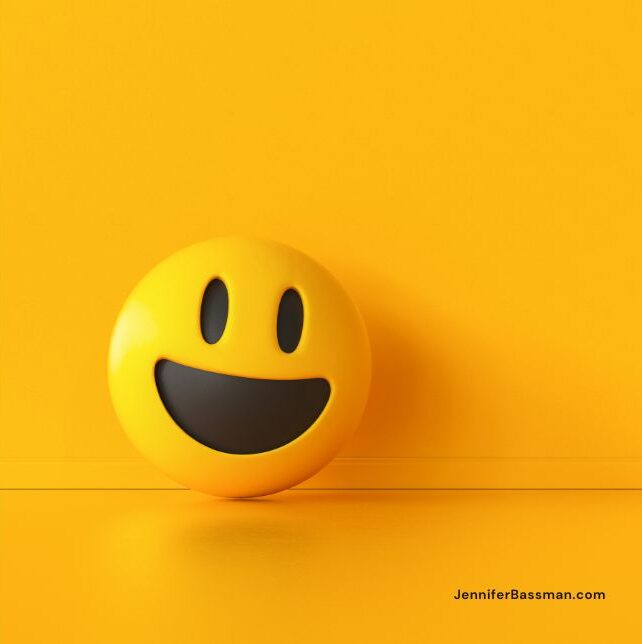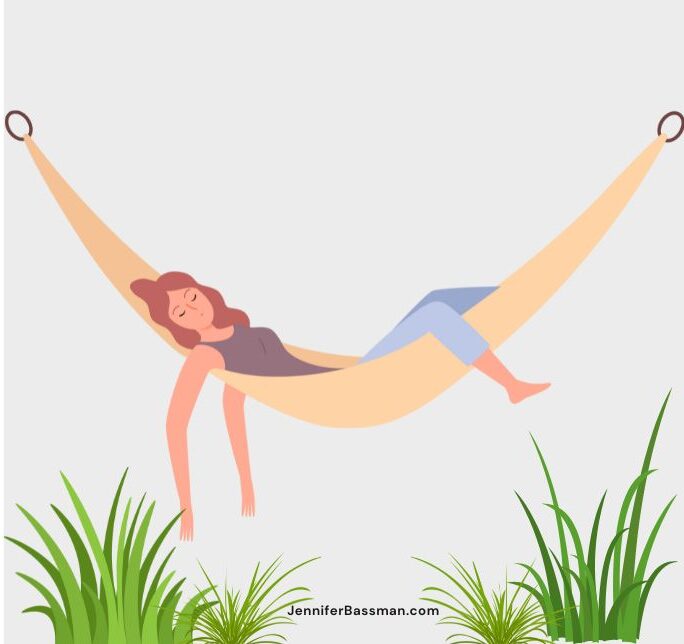Happiness and how to be happier pops up in conversations with my burned-out clients frequently.
They not only want to be happier, but feel happier and live a happier life.
No one is asking to skip around in a field of sunflowers or float through their day without anyone breaking their negativity shield.
A client asked a question in a way that left me thinking for a few days. “What do I need to get rid of in my life to allow room for joy and happiness?”
Her question was deeper than just how to be happier; it addressed what her chronic stress and burnout obscured, preventing even fleeting moments of happiness.
Furthermore, she was concerned because she’s never considered herself a naturally happy or optimistic person. Was it possible for her to be happier after recovering from burnout?
Laughter is THE BEST medicine to combat stress. You’ll laugh plenty when you join my community.
Happiness vs. Genetics vs. Environment
There have been some recent, interesting studies about what makes someone naturally happy versus naturally unhappy. Some of us really are naturally happy people, born with genetics and/or living in an environment that support a happier disposition.
However, others were born with the genetic disposition for happiness to feel elusive or impossible.
(You could also be naturally unhappy person that has learned how to choose happiness.)
According to the World Happiness Report in 2022, 30-40% of the differences in happiness between people is accounted for by genetic differences, which means that 60-70% of happiness is determined by environmental factors and experiences.
Your levels of happiness are not fixed from birth and can also change throughout your life in response to life experiences and your environment.
We All Have to Work at Happiness
If you were born with a set of genetic variants that makes it easier to feel happy – congratulations!
As for the rest of us, all is not lost. You are not doomed to a life of hopeless thinking or being a miserable fault-finder and ballbreaker.
Even naturally happy people have to put in the effort to bounce back from a bad day.
“We have more control than we think,” said Elissa Epel, PhD, researcher and co-creator of the The Big JOY Project and author of The Stress Prescription: Seven Days to More Joy and Ease. “We can take the reins and discover what we can do now – small things that can boost feelings of joy or content.”
Is It Possible to Be Happier When Burned Out?
I want to point out that it takes less energy to be happy than it does to remain perpetually pissed off. (Trust me, this was shocking information to me, as well.) This is one of the reasons that burnout is so exhausting.
Happiness is not a natural emotion when you are stressed or burned out. It actually feels impossible to find or experience it – not due to a lack of energy – but because you’ve settled into a negative mindset that can’t see other possibilities.
Even at a time when your brain is drowning in stress hormones, it’s important to find the things that still bring you happiness. And, I’m not talking about pretending or faking it till you make it.
Experiencing pure happiness – even brief moments of it – can help take the edge off of stressors and begin building resilience toward stress.
Let’s think about it this way: as your negative emotions build, so do your stress levels. Those negative emotions keep your stress response active and cycling. You need to do something to interrupt your stress response to stop it, so that your stress levels can drop.
Happiness, joy, and laughter can send your emotions in a positive direction and interrupt your stress response so you can relax again. Happiness can also drain the stress hormones that your brain is swimming in so that you can think clearly.
5 Things to GIVE UP If You Want to Be Happy
While this may sound obvious, you can’t be happy if you are drowning in or surrounded by negativity. There are habits that your burnout creates that keeps negativity around. If you want to make room for happiness, you need to give up these five things:
- Complaining: Complaining is like yelling at a brick wall. It might be satisfying for a second, but ultimately it is a time and energy suck. It is not solution-oriented and keeps you stuck in the miserable moment.
- Blaming others: If you have siblings, you may have learned the best way to get out of trouble or take the heat off of yourself is to blame someone else. When you don’t take responsibility for your mistakes, it only breeds more problems and animosity.
- Resistance to change: Our brains are naturally resistant to change, which makes it more difficult to have new experiences… and makes it even more difficult to evolve as a person with new ideas.
- Dwelling on the past: Remember when you wore socks with sandals and thought it was cool? Some things are better left in the past. Hanging on to negative emotions about something you can’t change just continues fruitless stress cycles to ruin things in the present.
- Limiting beliefs: Limiting beliefs keep you from reaching your goals and seeing your real potential. They aren’t conducive to creativity or happiness. Who feels happy when they are limited or held back?
5 Things to KEEP If You Want to Be Happy
Now that you have made room for happiness and joy, replace your bad burnout habits with behaviors that create happiness and build resilience to stress. These will make it easier to choose happiness in the face of adversity.
- Healthy boundaries: Know your limits and show others your self-respect by enforcing your boundaries. This will help you reduce feelings of overwhelm or being taken advantage of.
- Supportive relationships: Surround yourself with people who want to see you win – and who you want to see win, too. They will challenge you when necessary and support you when you need it the most. Make it a priority to deepen relationships with people you care about.
- Lifelong learning: If you are reading this, you are likely someone who values personal and professional growth. Continuing to seek knowledge and learn new skills will help grow your confidence and competence.
- Purpose and goals: Take time to find your passions and then stay focused on them. Having a clear goals that are based on what you are passionate about will allow you to feel fulfilled along the journey to reach them.
- Flexibility and adaptability: Life is unpredictable. I doubt very many people had a worldwide pandemic on their bingo cards in January 2020. Keep an open mind to the activity and needs that surround you so that you remain ready to adapt when necessary. When you are faced with unexpected challenges, ask yourself what you can learn.
Being Realistic About Happiness
You and I are going to have bad days. We are going to be faced with challenges that make us want to turn and run away. Being in the throes of burnout is a painful place to be. But, it’s important to figure out how to begin to refocus your attention to finding happiness and reminding yourself of the things or people you love.
Being happy doesn’t mean being unrealistic or ignoring pain.
This doesn’t mean you are giving up, giving in, or forcing a smile for the sake of world peace.
(If you have Resting Bitch Face like me, someone telling you to smile only makes things worse and motivates you to punch them.)
What’s important is recognizing that unhappiness doesn’t have to be a long-term or permanent mindset. You understand that misery brings you stress and is exhausting. Also, it doesn’t accomplish much. Go ahead – wallow in your misery for a bit and acknowledge that something sucks, but make a conscious effort to find a solution and move on.






